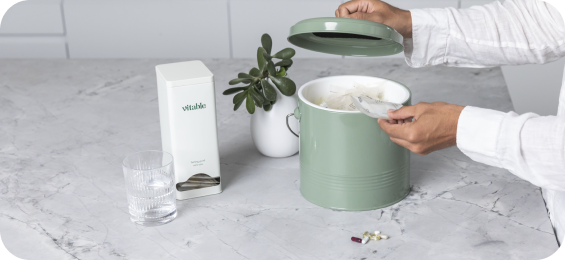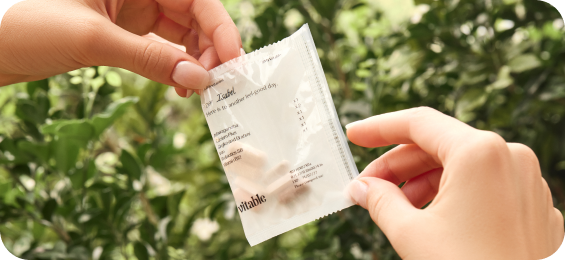A beginner's guide to composting


A beginner's guide to composting
Composting has come a long way in the last few years. Gone are the days of installing giant barrels in your backyard to ensure your compost eco-system thrives. Instead, there are so many composting options that cater to balcony's, small gardens and even your kitchen bench.
Why compost?
Composting is a simple and easy way to reduce household waste and give back to the planet while you do it.
With 7.3 million tonnes of food scraps going into the bin each year in Australia alone, contributing to 5% of greenhouse gases, it's a no-brainer. By starting a home-compost system in your household, you can reduce your contribution to food scraps that omit methane, a potent greenhouse gas, into the atmosphere.
Once the compost has broken down you can transfer it your green bin where it's more easily disposed of by your council, or create a rich and valuable soil resource for your garden. Win!
Where to get a compost bin
When looking for a bin, first check out your local council's website. Many of them offer subsidised compost bins to encourage people to reduce food waste going in to landfill. If you have a small space like a balcony or a cupboard under the sink, look at a 20-30L self-contained compost unit that requires little to no management. If you have a generously-sized backyard with lots of space, you can invest in a compost bin or tumbler (100-200L in size) and add worms to your mix to ensure your compost is rich in nutrients and degrading quickly.
How to compost in three simple steps
It might feel overwhelming but knowing a few composting basics is the key to getting started. If you get these right, you’ll be able to grow, manage and maintain your compost with minimal fuss, no unpleasant smells and all the benefits for you and the Earth.

1.Location, location, location
Once you have your compost bin, it's time to find somewhere to store it. Pick somewhere convenient for you so that you have easy access to it from your kitchen. It can be placed both in the sun or the shade; the warmer the location, the faster the compost will work. If you have to keep it outside, a handy tip is to buy a kitchen top bin and use a green compost bag to store your scraps - that way, just like taking out your waste bins, you can shuffle your scraps to the compost a few times a week instead of every time you cook.
2.Build up your layers
Add a layer of dried leaves and twigs to the base of your compost bin and drench it in water to create a damp environment for bacteria to grow and for the waste to decompose.
Next, add a layer of 'green scraps' like clippings, plant scraps, and grass - ensure it's about the same thickness as the previous layer. For your final layer, add a mixture of green scraps, dried leaves, veggie scraps, a little bit of soil from the garden, shredded newspaper and straw. Dampen with more water.
3.Get composting
Now your compost is ready to fly! You can add food scraps and other green materials to your compost bin as often as you like. Every time you empty your scraps into the compost bin, be sure to cover them with a layer of brown material (soil, leaves, twigs) to build a balanced compost and give it a stir with a large stick every week to create aeration - this allows the compost ecosystem to 'breathe'. Your compost will be ready to transfer to your green bin or garden beds when it looks like rich, dark soil. If it's not breaking down this could be because it's too dry, too wet or needs more air.
Can I compost my Vitable sachets?
Absolutely. Our daily vitamin packaging is made from sustainably sourced, plant-based cellulose produced from sustainably harvested Eucalyptus trees which are certified to be GMO-free. The material we use is certified home compostable - meaning no unnecessary waste for you.

How it works
Our sachets break down naturally and return nutrients back into the soil under home-composting conditions without releasing toxins. The sachet film has been independently tested and certified by TUV AUSTRIA’s OK compost HOME system and holds the Australian ABA certification. Meaning they have been proven to break down at set composting conditions and checked for eco-toxicity.
Are there some ingredients I shouldn't compost?
Glad you asked. There are a number of items that you should only add to your compost in small amounts and some you should never add.
Avoid adding:
- Too many onions, lemons and acidic ingredients, as these can be difficult to break down and affect the pH of your compost.
Never add:
- Meat and dairy products as these can attract rodents and pests - and may cause the compost to go rancid.
- Dog or cat faeces or any human waste.
- Plastics, metals, chemicals or household cleaning solutions.
- Weeds, diseased plants, gum leaves or treated pine sawdust.
- Glossy magazines, or paper with chemical coatings and ink.
So there, you have it - a simple quick-fire guide to get you composting!